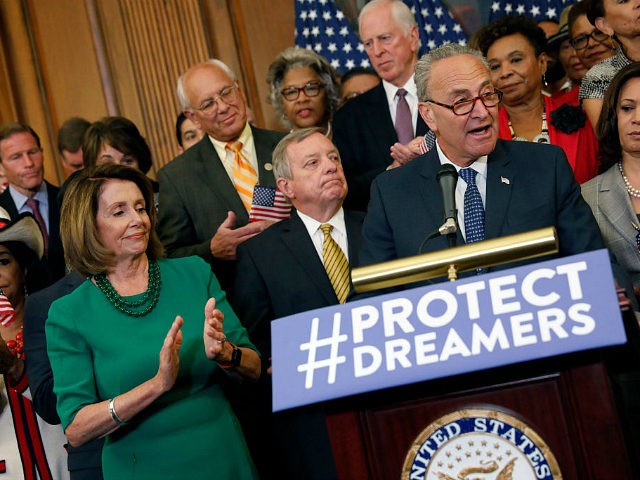The Supreme Court ruled 5-4 on Thursday that President Donald Trump could not end the Deferred Action for Childhood Arrivals (DACA) program — at least not the way that his administration had done it.
DACA was a program created by President Barack Obama in 2012 after Congress refused to pass Democrats’ version of amnesty for so-called “Dreamers” — illegal aliens brought to the country as minors. When Sen. Marco Rubio (R-FL) proposed a Republican version of the proposal, and amnesty advocates seemed inclined to support it, Obama imposed his own policy by fiat.
Conservatives have long believed that DACA was unconstitutional, because it circumvented the legislature and applied the administration’s power of prosecutorial discretion to an absurdly large number of potential defendants (2 million).
In 2017, then-Attorney General Jeff Sessions declared DACA was unconstitutional, representing “an unconstitutional exercise of authority by the Executive Branch.” President Trump rescinded DACA but gave Congress six months to find a compromise to protect the “Dreamers” from deportation, and proposed his own ideas in his State of the Union address in 2018, but Democrats refused his suggestion.
The Thursday case, Department of Homeland Security v. Regents of the University of California, came about after several plaintiffs challenged the administration’s decision to end DACA.
In a complex, 5-4 opinion, in which Chief Justice John Roberts joined the Court’s four liberal justices, the majority held that the administration had failed to offer sufficient reasons for rescinding the policy, and had failed to provide enough consideration about what would happen to the 700,000 people who had registered for the DACA program.
“The dispute before the Court is not whether DHS may rescind DACA. All parties agree that it may. The dispute is instead primarily about the procedure the agency fol- lowed in doing so,” the opinion by Justice Roberts declared.
The partial dissent, written by Justice Clarence Thomas, argues that the fact that DACA was unconstitutional and unlawful from the outset should preclude any ruling by the Court on the question of whether it was rescinded properly:
DHS created DACA during the Obama administration without any statutory authorization and without going through the requisite rulemaking process. As a result, the program was unlawful from its inception. The majority does not even attempt to explain why a court has the authority to scrutinize an agency’s policy reasons for rescinding an unlawful program under the arbitrary and capricious microscope. The decision to countermand an unlawful agency action is clearly reasonable. So long as the agency’s determination of illegality is sound, our review should be at an end.
Today’s decision must be recognized for what it is: an effort to avoid a politically controversial but legally correct decision.
…
Under the auspices of today’s decision, administrations can bind their successors by unlawfully adopting significant legal changes through Executive Branch agency memoranda.
The Court’s decision essentially leaves the fate of DACA to be decided by the November presidential election.
Joel B. Pollak is Senior Editor-at-Large at Breitbart News and the host of Breitbart News Sunday on Sirius XM Patriot on Sunday evenings from 7 p.m. to 10 p.m. ET (4 p.m. to 7 p.m. PT). His new book, RED NOVEMBER, is available for pre-order. He is a winner of the 2018 Robert Novak Journalism Alumni Fellowship. Follow him on Twitter at @joelpollak.

COMMENTS
Please let us know if you're having issues with commenting.